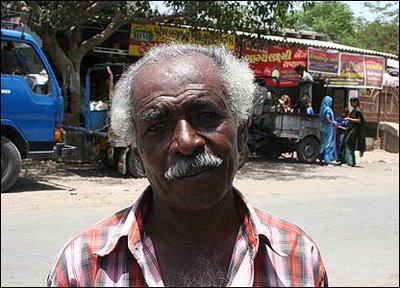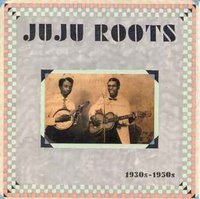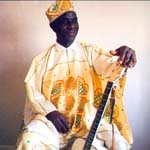This is going to be a hard one, being a scarcely researched and totally subjective topic- depending on whether you're Nigerian, Ghanaian, Liberian or Sierra Leonian. The Palmwine Guitar sound is a distinctive Folk sound, which originated in West Africa at the turn of the 20th century. As the story goes, the style emanated from Sierra Leone, where the Portuguese and Spanish sailors whose ships berthed on Merchant ships on the West African Coastal ports of Freetown (Sierra Leone) , Lagos (Nigeria), Monrovia (Liberia) and Accra/Tema (Ghana) lent their Guitars and style to their African shipmates who formulated a unique style fusing native rhythms with the Latin style bequeathed by their Latin benefactors and resulting in an expressive twangy, melodious Guitar sound.
The early African Guitar pioneers, primarily played (in an era before Ipods/Walkmans) on the ships in their spare time to entertain themselves, often raw and rudimentary, a revolution was nonetheless taking place. The Guitars were often played to accompany Native vocal renditions, varied in their content but often centred around themes of Love and peace , Native wisdom, satire and often times personal angst and social commentary.
As time went on the Guitar moved away from the exclusive preserve of the African sailors to the general populace and the local musicians adopted the Guitar, Violin, Mandolin, Banjo (and rather annoyingly that dreadful Instrument- The Kazoo) as elitist forms of expression. A word of note, West African musicians in general played in the Traditional form (using Traditional instruments) at Funerals, Weddings, Religious Feasts and Festivals and to entertain Royalty in Court and not much else- these were the elite. The new Guitar elite as referred to previously occupied a middle stratum in the urban centres, playing at solcial functions for the Urban elite i.e the new Native professional class of Lawyers, Doctors, Engineers and Businessmen, being mostly educated in the UK such as the E.K. Bannerman's, Tetteh Addo's, A. Quartey-Papafio brilliant Ghanaian Barristers of the early 20th century, G.Sorunkeh-Sawyer, A. Dove-Edwin Sierra Leonian Barrister and Doctor respectively, A.Sapara-Williams, Sir Kitoyi-Ajasa, Eric Moore, Joseph Egerton-Shyngle (Lagos Barristers), Dr Doherty, Dr Da Rocha, Dr Curtis Adeniyi-Jones (Doctors) and successful Traders like Da-Rocha, the extremely gifted female Trader- Ore Moore (a product of finishing school in England and reputedly a classically trained Pianist and fluent in three European languages). They were the native elite and usually demanded the best musical entertainment, ranging from Classical Pianists to the emerging group of elite local modern musicians.
At the lower end of the rung were the Bards and Minstrels, who would go round houses and local bars in the evening (when self respecting people had come back from work) and get a few cowries or pennies for their troubles, often walking several miles on this beat, kind of like Mobile buskers (this practice continues till today). Their Guitar heroics being accompaniment to tales of joy and pain and mostly praise singing of their often inebriated and mostly ego-possessed clients, they would often move around solo or accompanied by Native drummers or Thumb Pianists (Agidigbo in Nigeria) and a variety of other Native Instruments. I recall being told by my Grandmother about a famous Nigerian Minstrel Irewolede Denge "Denge Omo Ijebu"- (Denge son of Ijebu, a local town). Who would walk through the old city of Lagos in the early 20's stopping at the famous Water House- Home of the Afro-Brazilian Millionaire- Da Rocha to deliver a praise singing rendition, of which he would be assured of at least a couple of pennies (if the old fella was in or awake or indeed in the mood) ending his journey in Old Yaba in the Lagos Mainland (where my Grandmother lived), through the newly built Carter Bridge- a distance of about 9 miles. Needless to say Denge died young.
The Minstrels would often play to punters at Palmwine Bars along the West African coast. Palmwine by the way has been one of the drinks of choice in West Africa for eons, tapped from the Bark of the Palmtree and yeast-fermented on the Tree for a few days and served straight from the tree in Calabashes (gourds), its a sweet, tangy Intoxicating drink and consumed with spicy beef, Snail or Roasted Squirrel (Bushmeat). The particular style which emerged became known as the Palmwine Guitar. To really show your savvy, please use the term "Palmy" the Guitarist will love you forever and probably buy you a drink- but don't take my word for it.
The Palmwine Guitar style evolved over the years and fused with various forms, became most popularly known as Highlife, being a fusion of Big Band Native rhythms and indeed the Palmwine Guitar style. one of the biggest superstars of this fusion was the Ghanaian Tenor Saxman- E.T.Mensah and his Tempos Band formed in the 30's, whose popularity stretched far beyond Ghana.
However the purists have refused to be swayed and the old boys and young hawks have stayed faithful to the Sailors and Minstrels of yore.
Heroes of the Palmwine Guitar are as follows:
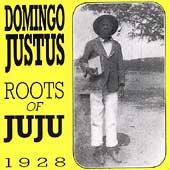 Onyiira:
Onyiira: The great Ghanaian Palmwine Guitarist of the 1930's, who influenced the next generation of Koo Nimo, TO Jazz and many others.
Ebenezer Calendar: Sierra Leonian Palmwine Guitar Superstar who popularised the genre in the early 50's
<-S.E Rogie: Souliman Rogers, was a Sierra Leonian Guitarist whose "My lovely Elisabeth" is rated as the most popular Palmwine Guitar song ever written.
Julius Araba- Nigerian Senior civil servant and Palmwine Guitar exponent. Famed for his studious dexterity on the Palmwine Guitar, whose band was one of the most popular in colonial Lagos in the late 40's through to the 50's. His band featured a certain Fatai Rolling Dollar on Guitar and who wrote most of the band's songs.

Fatai Rolling Dollar: One of the most enigmatic and innovative
-> characters who influenced a whole generation of Nigerian Musicians like Fela Kuti, Ebenezer Obey (who he taught to play the Guitar), King Sunny Ade, Orlando Owoh to name a few. He started out playing the Agidigbo Thumb Piano and the Guitar which he learnt whilst working on the old British Merchant Navy in the late 40's. Famously playing for Lucky Strike cigarettes when on shore. He later joined The popular Araba Julius Combo in the 40's and wrote several popular songs. FRD is very much alive and even at the age of 80+ (exact age unknown, but certainly over 80) he recently toured with Tony Allen and even more surprisingly had a baby son less than three years ago. I've witnessed this gentleman performing a live set from 8.30pm till 2am - non-stop and wait for it.. this year! Place this in the context of the fact that a lot of European musicians never play more than a 2 hour set with a break in between. This guy comes from a background where musicians play sets for as long as 10 hours with few breaks in between. I have personally played sets back in Nigeria and in African venues in London almost non-stop from 9.00pm till 4.30am (with two breaks of 10 minutes each) FRD, has all his life been no stranger to hard graft, ex-sailor, hard-core musician and after losing everything to the attack on Fela Kuti's property (his house and all his worldly possessions were burnt- a poverty-stricken fisherman in the brackish, mosquito-infested creeks of the Lagos lagoon for almost 20 years before his rediscovery in 2000 and re-emergence. I also recall being in the studio with FRD at about 6.30am after an all day and all-night session and this man was still roaring, whilst the rest of us were dead on our feet- even the Engineer was dropping off. His is a story of the triumph of sheer will and strength of character. His quoted words to a French Journalist are all I need to add "I am like a Tiger ready for action". Damn right he is.
http://www.soundclick.com/bands/pageartist.cfm?bandID=372069 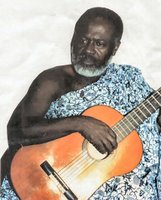
One of the most popular heroes of this genre, Daniel Amponsah- his real name-was a Ghanaian Lab Technologist who took up the Guitar in his spare time and became the face of Palmwine Guitar to the world whilst a Visiting Lecturer in Universities in the USA in the 1970's, Also an Ashanti Chief before his death.
In conclusion, this Guitar style is part of the heritage of West Africa and part of the common musical currency of the people of the region, inspite of differences in its subjective history. There are modern exponents who have taken the genre to another level, people like Oscar Elimbi, (whose performance on the Band Ikenga's track Songs at Sunset is critically acclaimed as one of the best Palmwine Guitar performances of recent times (totally subjective of course)
http://www.soundclick.com/bands/pagemusic.cfm?bandID=49183 ) Abdul Tee-Jay, Piper Jay, Alfred Bannerman, Alaba Pedro, Rennie Lendjou and Joe Mbule who have kept the flag flying.

